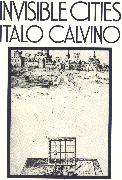Invisible Cities

From Invisible Cities (1972) by Italo Calvino:
Kublai Khan says: I do not know when you have had time to visit all the countries you describe. It seems to me you have never moved from this garden.
Marco Polo replies thus: Everything I see and do assumes meaning in a mental space where the same calm reigns as here, the same penumbra, the same silence streaked by the rustling of leaves. At the moment when I concentrate and reflect, I find myself again, always, in this garden, at this hour of evening, in your august presence, though I continue without a moments pause, moving up a river green with crocodiles or counting the barrels of salted fish being lowered into the hold.
You could consider Invisible Cities in several ways: as a series of linked stories on a single theme, or as a sort of prose poem, or even as a continuous narrative. One reviewer suggests that this book was designed to be dipped into rather than read through, also that it is perhaps not the best of Calvino’s books to start with. I was at a disadvantage on both counts. I read it straight through at 3 in the morning about two weeks ago and have been slightly troubled, indeed haunted, by it ever since.
Gore Vidal, writing in The New York Review of Books commented: "Of all tasks, describing the contents of a book is the most difficult and in the case of a marvelous invention like Invisible Cities, perfectly irrelevant."
I fear this is true, but will try nonetheless to give sufficient of a flavour to (maybe) entice some more readers to give it a go.
Invisible Cities describes imaginary conversations between Marco Polo and Kublai Khan. The Great Khan wishes to hear reports about his vast empires, which it is beyond his ability to visit himself. Marco Polo describes his visits to a series of surreal cities in the Khan's domain, each city being characterized by a unique quality or concept and each one given a name which is evocatively feminine. Cities are categorized under headings as, for example, Cities and Memory, Cities and Signs, Cities and Names, Cities and the Dead….It is for the reader (along with Kublai Khan!) to read significance into Marco Polo's fragmented tales, to puzzle over the metaphorical sense of each narrative.
The Great Khan is old and weary but still, despite his scepticism, wants the youthful Polo to enchant and amaze him with accounts of his own domains. When even the ever-inventive Polo finally tires and says that he has told him of all the cities he knows, Kublai Khan says:
“There is one city of which you never speak.”
Marco Polo bowed his head.
“Venice” the Khan said.
Marco smiled. “What else do you believe I have been talking to you about?”
When pressed to speak directly about Venice, Marco says this:
“Memory’s images are fixed in words, are erased. Perhaps I am afraid of losing Venice all at once, if I speak of it. Or perhaps, speaking of other cities, I have already lost it, little by little.”

2 comments:
Celia, you made the cardinal and unforgiveable mistake of trying to explain Calvino! :)
i'm so glad you're haunted by invisible cities.
You MUST try Mr. Palomar.
His most 'human' book (or at least of those I've read) is Marcovaldo.
And 'Baron' is a dream as well.
Castle of crossed destinies is only something you will understand since apparently you are supposed to have read every great book to make sense of it. didn't like it.
oh yes, his essays are fab.
Omigod! Was I really trying to explain? But I suppose its in my nature to search for meanings in everything......
There's a plethora of stuff, academic theses etc. about Calvino on the internet (and I'm trying hard not to look at them - see my Comment on YOUR blog!)In fact, I think I'll just buy that book and live with it a while.
As for any other of his books - maybe.
Post a Comment